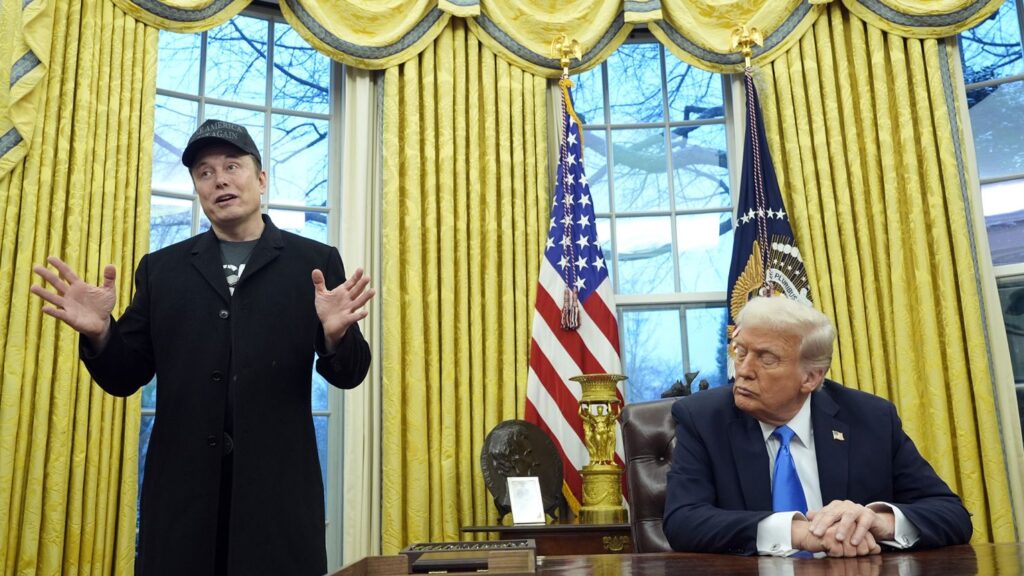The United States government has undergone many reforms throughout its history, but few have been as radical and controversial as the creation of the Department of Government Efficiency (DOGE). Created by President Donald Trump and led by billionaire Elon Musk, the DOGE was designed with the mission of cutting costs, eliminating waste, and restructuring the federal government, promoting what its creators call an extreme modernization of the public sector.
However, from its early weeks of operation, the department’s actions have sparked strong resistance from public servants, lawmakers, and oversight groups, who accuse the new entity of operating without transparency, violating civil rights, and jeopardizing essential services for the population.

With abrupt budget cuts, agency closures, and unprecedented access to confidential information, the DOGE quickly became the target of investigations and lawsuits. Still, Musk and his allies continue to defend that this transformation is necessary to “end the corrupt bureaucracy” and ensure a more efficient, results-oriented administration.
But what exactly is the DOGE? How does it operate? What are its goals? And, above all, what are the consequences of this new approach for the functioning of the U.S. government?
The creation of the Department of Government Efficiency was announced in the early days of Donald Trump’s second term. Inspired by his vision of a smaller, more agile government, Trump introduced the proposal for a “radical management shock,” focused on reducing state bureaucracy and cutting unnecessary expenses.
To lead this initiative, he chose Elon Musk, an entrepreneur widely known for his disruptive work in the technology, transportation, and aerospace sectors. Musk’s appointment was controversial from the start, not only because of his lack of experience in public administration but also due to his direct involvement in billion-dollar government contracts, which raised accusations of a conflict of interest.
The DOGE was designed to operate as an independent entity within the federal structure, with broad powers to review contracts, restructure agencies, and propose drastic changes in public governance. However, the department’s initial actions indicated that its ambitions went far beyond what was initially imagined.
In the first three weeks since its creation, the DOGE set off an unprecedented wave of transformations. Among the main actions led by the department, the following stand out:
- Mass Layoffs and Suspensions: Thousands of government employees were laid off or had their contracts suspended. Many of these dismissals happened without prior notice and affected strategic sectors of public administration.
- Access to Confidential Data: DOGE teams were seen circulating within government agencies without formal authorization, demanding access to payment systems and databases containing confidential information about U.S. citizens.
- Agency Closures: The department began dismantling the U.S. Agency for International Development (USAID), one of the country’s main humanitarian aid organizations. Other agencies were also listed for possible dissolution.
- Government Spending Cuts: DOGE canceled “excessive” contracts, including diversity, equity, and inclusion (DEI) projects, and various leases for public buildings deemed “underutilized.”
These actions caused alarm among lawmakers and public servants, leading to calls for investigations and lawsuits against the department.
Elon Musk adopted a combative tone in justifying the DOGE’s actions. On his social media, he compared the current moment to the founding of the United States, stating that the country was undergoing a “Second American Revolution.”
“The people voted for a major government reform, and that’s what the people are going to get. That’s what democracy is all about,” Musk stated during a Q&A session in the Oval Office.
Moreover, the billionaire accused government employees of corruption, claiming that many had become millionaires through fraud and bribery. “The reality is they are getting rich at the taxpayer’s expense,” he declared, without providing concrete evidence.
However, Musk’s statements generated criticism and resistance within the government. Democratic senators sent an official letter to the White House, questioning the lack of transparency from the DOGE and requesting explanations about its structure and goals.
Meanwhile, oversight groups filed lawsuits claiming the department was structured to hide its communications and avoid external oversight.
Although there is still no detailed public plan, some directions have already been outlined:
- Automation and Technology: Musk intends to replace bureaucratic processes with automated systems, using artificial intelligence to optimize public services.
- Privatizations and Partnerships with Technology Companies: There is speculation that DOGE will seek to transfer certain government functions to private companies, potentially benefiting Musk’s own businesses.
- Continual Budget Cuts: The department will continue reviewing federal contracts, eliminating ineffective programs, and reducing expenditures deemed unnecessary.
However, the lack of clarity regarding the criteria for cuts and the affected areas concerns experts, who warn of the risks of dismantling essential services such as healthcare, education, and public safety.
Another controversial point is Musk’s position within the federal structure. Despite holding one of the highest unelected government positions, the billionaire will not be required to disclose his finances publicly, which prevents scrutiny of potential conflicts of interest.
Critics point out that Musk holds billions of dollars in government contracts through SpaceX, Tesla, and other companies, and his influence within the DOGE may be used to favor his own businesses.
Nevertheless, oversight groups continue to press the government to increase DOGE’s transparency.
The DOGE’s trajectory promises to be turbulent. While Musk and Trump remain firm in their implementation of their extreme government reform plan, opposition within Congress, legal proceedings, and public outcry may force adjustments to the approach.
Regardless of the outcome, one thing is certain: the DOGE has already become one of the most controversial initiatives in recent U.S. history, and its impact will be felt for a long time.

